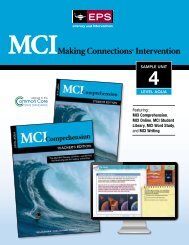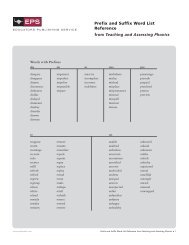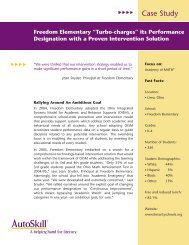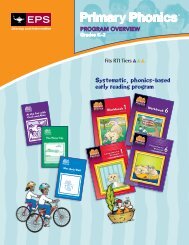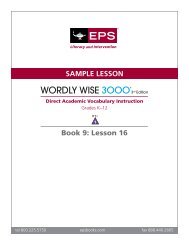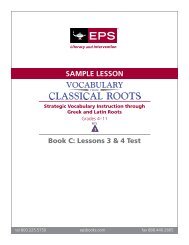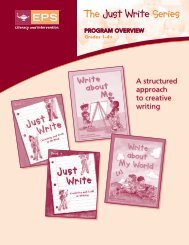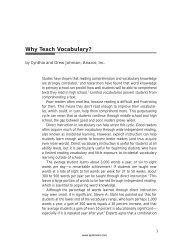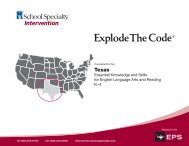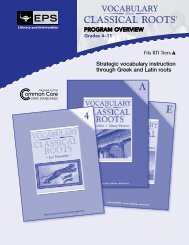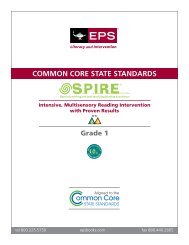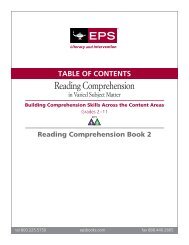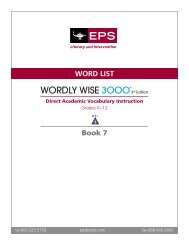Book 7: Lesson 9
Book 7: Lesson 9
Book 7: Lesson 9
Create successful ePaper yourself
Turn your PDF publications into a flip-book with our unique Google optimized e-Paper software.
Sample <strong>Lesson</strong><br />
®<br />
WORDLY WISE 3OOO 3 rd Edition<br />
Direct Academic Vocabulary Instruction<br />
Grades K–12<br />
RTI<br />
<strong>Book</strong> 7: <strong>Lesson</strong> 9<br />
tel 800.225.5750 epsbooks.com fax 888.440.2665
<strong>Lesson</strong><br />
9<br />
For more practice and games, go<br />
to www.WordlyWise3000.com.<br />
Word List<br />
dumbfound<br />
dum´ found<br />
ensue<br />
en sōo´<br />
era<br />
er´ ә<br />
flourish<br />
flur´ ish<br />
garrison<br />
gar´ ә sә n<br />
Study the definitions of the words. Then do the exercises that follow.<br />
v. To make speechless with amazement.<br />
The announcement that my cat Patch had won “best of show”<br />
dumbfounded me.<br />
dumbfounded adj. Speechless with amazement.<br />
The dumbfounded tenants stared at the eviction notice in disbelief.<br />
v. To follow; to come as a result of or at a later time.<br />
When the headmaster declared the next day a holiday, shouting and clapping<br />
ensued.<br />
n. A particular period in history.<br />
The era of space exploration began in the 1950s.<br />
v. 1. To thrive or prosper.<br />
Plants flourish in a greenhouse.<br />
2. To wave in the air.<br />
The softball player flourished her hat above her head to acknowledge the<br />
crowd’s cheers.<br />
n. 1. A sweeping motion.<br />
The star of the show made her first entrance with a flourish.<br />
2. A showy burst of music.<br />
The opera begins with a flourish of trumpets.<br />
3. A fancy line or curve added to something written.<br />
His artistic nature was expressed in the flourish with which he signed<br />
his name.<br />
n. 1. Soldiers stationed in a place to protect it.<br />
The garrison held off the enemy for four days before capitulating.<br />
2. A military place of protection, together with its soldiers and weapons.<br />
The garrison controlled the only passage through the mountain range.<br />
v. To provide soldiers with a place to live.<br />
The commander had to garrison the troops in an old schoolhouse.<br />
grievous<br />
grē´ vә s<br />
adj. Causing grief or pain; hard to bear.<br />
It was a grievous loss to the entire family when our pet dog Tiny died.<br />
© SSI • DO NOT DUPLICATE<br />
Wordly Wise 3000 • <strong>Book</strong> 7 83
hoard<br />
hôrd<br />
inundate<br />
in´ ә n dāt<br />
invincible<br />
in vin´ sә bә l<br />
nomad<br />
nō´ mad<br />
placate<br />
plā´ kāt<br />
principal<br />
prin´ sә pә l<br />
recede<br />
ri sēd´<br />
ruthless<br />
rōoth´ lә s<br />
v. To save and put away, especially secretly.<br />
Squirrels hoard acorns for the winter.<br />
n. Anything put away in such a manner.<br />
My hoard of comic books includes several authentic 1930s Superman comics.<br />
v. 1. To cover, as with water from a flood.<br />
The valley was inundated when the dam burst.<br />
2. To load with an excessive amount or number of something.<br />
Fans inundated radio stations with requests to play the Wailers’ new album.<br />
adj. Impossible to defeat.<br />
When the Yankees had a fifteen-game winning streak, we began to think they<br />
were invincible.<br />
n. A member of a group that settles briefly in one place and then moves on to<br />
another.<br />
The Bedouins of the Sahara and Arabian deserts were nomads.<br />
nomadic adj. (nō mad´ ik) Having the characteristics of a nomad.<br />
After acquiring horses in the 1760s, the Cheyenne became nomadic buffalo<br />
hunters on the Great Plains.<br />
v. To stop from being angry; to calm.<br />
I was able to placate my friend when I explained my reason for being late.<br />
adj. Most important.<br />
The administration’s principal objective is to reduce the school dropout rate.<br />
n. 1. A person or thing that is of the greatest importance.<br />
The club owners and the players’ agent are the principals in the dispute over<br />
baseball players’ salaries.<br />
2. The head of a school.<br />
The principal has the authority to hire extra teachers if student enrollment<br />
increases.<br />
3. The sum of money owed, not including the interest.<br />
You would need $8,479 to pay off the principal on the car loan.<br />
v. 1. To move back or to drop to a lower level.<br />
The tide receded and exposed the rocks near the shore.<br />
2. To become fainter.<br />
The blare of the music from the car’s radio receded as it disappeared into<br />
the night.<br />
adj. Showing no mercy; pitiless.<br />
Disease and inadequate supplies finally terminated the ruthless invader Attila<br />
the Hun in fifth-century Europe.<br />
84 <strong>Lesson</strong> 9
sacrifice<br />
sak´ rә fīs<br />
n. 1. Something given up for the sake of another.<br />
The parents made many sacrifices so that their children could go to college.<br />
2. An offering to a god.<br />
In the Incan culture, sacrifices were often made during or after an earthquake,<br />
drought, or epidemic.<br />
v. 1. To give up something for another.<br />
I sacrificed my privacy by sharing my room with my sister.<br />
2. To offer something of value to a god.<br />
Goats and dogs were sacrificed at the ancient Roman festival of Lupercalia.<br />
9A<br />
Finding Meanings<br />
Choose two phrases to form a sentence that correctly uses a word from<br />
Word List 9. Write each sentence in the space provided.<br />
1. (a) A flourish is (c) A garrison is<br />
(b) a burst of music.<br />
(d) a troubling situation.<br />
___________________________________________________________________<br />
___________________________________________________________________<br />
2. (a) A principal is (c) A hoard is<br />
(b) an exchange for something else. (d) a collection put away secretly.<br />
___________________________________________________________________<br />
___________________________________________________________________<br />
3. (a) speechless with amazement. (c) To be inundated is to be<br />
(b) To be grievous is to be (d) covered with water.<br />
___________________________________________________________________<br />
___________________________________________________________________<br />
4. (a) provide them with a place to live. (c) try to satisfy their demands.<br />
(b) To sacrifice soldiers is to (d) To garrison soldiers is to<br />
___________________________________________________________________<br />
___________________________________________________________________<br />
5. (a) a sum of money owed. (c) Principal is<br />
(b) a truth by which we govern (d) A nomad is<br />
ourselves.<br />
___________________________________________________________________<br />
___________________________________________________________________<br />
© SSI • DO NOT DUPLICATE<br />
Wordly Wise 3000 • <strong>Book</strong> 7 85
dumbfound<br />
ensue<br />
era<br />
flourish<br />
garrison<br />
grievous<br />
hoard<br />
inundate<br />
invincible<br />
nomad<br />
placate<br />
principal<br />
recede<br />
ruthless<br />
sacrifice<br />
6. (a) calm that person. (c) To placate someone is to<br />
(b) To dumbfound someone is to (d) show that person no mercy.<br />
___________________________________________________________________<br />
___________________________________________________________________<br />
7. (a) prevented from moving. (c) speechless with amazement.<br />
(b) To be dumbfounded is to be (d) To be invincible is to be<br />
___________________________________________________________________<br />
___________________________________________________________________<br />
8. (a) An era is (c) a burst of music that announces<br />
an arrival.<br />
(b) A sacrifice is<br />
(d) something that is given up for another.<br />
___________________________________________________________________<br />
___________________________________________________________________<br />
9. (a) lack the means to support (c) Ruthless people are those who<br />
themselves.<br />
(b) keep moving from place to place. (d) Nomadic people are those who<br />
___________________________________________________________________<br />
___________________________________________________________________<br />
10. (a) a person of the greatest (c) A flourish is<br />
importance.<br />
(b) An era is<br />
(d) a sweeping motion.<br />
___________________________________________________________________<br />
___________________________________________________________________<br />
11. (a) A ruthless person is one who (c) exists only in stories.<br />
(b) An invincible person is one who (d) cannot be defeated.<br />
___________________________________________________________________<br />
___________________________________________________________________<br />
86 <strong>Lesson</strong> 9
9B<br />
Just the Right Word<br />
Improve each of the following sentences by crossing out the bold phrase and<br />
replacing it with a word (or a form of the word) from Word List 9.<br />
1. Oil is the most important export of Saudi Arabia.<br />
2. John Hancock wrote his name with a decorative sweeping line when he<br />
signed the Declaration of Independence.<br />
3. In Greek myths, an animal was sometimes slaughtered as an offering by a<br />
mortal to please the gods.<br />
4. Some people believe you have to be unwilling to show any pity to those<br />
with whom you have dealings in order to succeed in business.<br />
5. Many childhood memories gradually become fainter and fainter as we<br />
grow older.<br />
6. Tennis suffered a serious and very sad loss when Arthur Ashe died.<br />
7. The period in history given the name of “the cold war” ended in 1990 with<br />
the easing of tension between the United States and the Soviet Union.<br />
8. If this heavy rain continues, soil erosion will follow as a result of it.<br />
9. The soldiers housed in a protected place suffered few casualties during<br />
the attack.<br />
© SSI • DO NOT DUPLICATE<br />
Wordly Wise 3000 • <strong>Book</strong> 7 87
9C<br />
Applying Meanings<br />
Circle the letter or letters of each correct answer. A question may have more<br />
than one correct answer.<br />
1. Which of the following responses might placate an irate customer<br />
(a) “Don’t blame me; I just (c) “Would you calm down!”<br />
work here.”<br />
(b) “I’ll take care of the problem.” (d) “Let me get the manager.”<br />
2. A town can be inundated with which of the following<br />
(a) floodwaters<br />
(c) winds of hurricane force<br />
(b) tourists<br />
(d) requests for tourist information<br />
3. Which of the following can flourish<br />
(a) a business<br />
(c) a tree<br />
(b) a country<br />
(d) an incident<br />
4. Which of the following could be the length of an era<br />
(a) one year<br />
(c) a couple of centuries<br />
(b) twenty seconds<br />
(d) a couple of hours<br />
5. Which of the following can be hoarded<br />
(a) health<br />
(c) food<br />
(b) wealth<br />
(d) solitude<br />
WL_Sidebar<br />
dumbfound<br />
Bk6 ensue<br />
era<br />
flourish<br />
garrison<br />
grievous<br />
hoard<br />
inundate<br />
invincible<br />
nomad<br />
placate<br />
principal<br />
recede<br />
ruthless<br />
sacrifice<br />
6. Which of the following is true of a nomad<br />
(a) is part of a group<br />
(c) works at a 9 to 5 job<br />
(b) has a permanent home (d) lives mostly in cities<br />
7. Which of the following applies to the word principal<br />
(a) It is not a noun.<br />
(c) It is a noun only.<br />
(b) It can be a noun or an adjective. (d) It is an adjective only.<br />
8. Which of the following can be grievous<br />
(a) a wound<br />
(c) a loss<br />
(b) a respite<br />
(d) a privilege<br />
88 <strong>Lesson</strong> 9
9D<br />
Word Study<br />
Write a synonym for each of the numbered words. Choose from the boldfaced<br />
words below.<br />
consider joy amaze satisfy hasty<br />
manage overcrowded brave proud beg<br />
1. cope<br />
2. congested<br />
3. beseech<br />
4. ponder<br />
5. gratify<br />
6. haughty<br />
7. dumbfound<br />
8. rapture<br />
9. impetuous<br />
10. plucky<br />
© SSI • DO NOT DUPLICATE<br />
Wordly Wise 3000 • <strong>Book</strong> 7 89
9E<br />
Passage<br />
Read the passage. Then answer the questions that follow it.<br />
The Spanish Conquest of Mexico<br />
WL_Sidebar<br />
dumbfound<br />
Bk6 ensue<br />
era<br />
flourish<br />
garrison<br />
grievous<br />
hoard<br />
inundate<br />
invincible<br />
nomad<br />
placate<br />
principal<br />
recede<br />
ruthless<br />
sacrifice<br />
For over two hundred years, until it was overthrown by Spanish<br />
invaders in 1519, the Aztec empire in Mexico was a prosperous and<br />
highly cultivated society. Many arts and sciences flourished; the<br />
Aztecs developed astronomy, mathematics, engineering, agriculture,<br />
sculpture, and music to a far higher degree than did the Europeans<br />
of that era. At the same time, they were a warlike people, ruthless in<br />
battle, and their religious beliefs involved acts of extreme cruelty. Prisoners of<br />
war were offered as human sacrifices to their many gods. The Aztecs believed<br />
that the gods had already destroyed the world four times, and unless they<br />
were placated in this way, they would destroy it again.<br />
The Aztecs were originally a nomadic people who lived mainly by<br />
hunting. Around the year 1300, they settled on an island on Lake Texcoco.<br />
The land there was wet and swampy, but the Aztecs drained the marshes<br />
and became farmers. Their principal crop was corn; they also grew beans,<br />
squash, and chili peppers. Over a two-hundred-year period, they created<br />
an empire extending across central Mexico from the Gulf of Mexico to the<br />
Pacific. Its capital was Tenochtitlán, which we know today as Mexico City. In<br />
1500, Tenochtitlán was inundated by a terrible flood that drowned many of<br />
its people. After the floodwaters had receded, the Aztecs quickly rebuilt their<br />
city, but a far worse catastrophe was to follow.<br />
In 1519, a Spanish explorer named Hernando Cortéz landed in Mexico<br />
with an army of 600 soldiers. He established a garrison in what is now the city<br />
of Vera Cruz on Mexico’s east coast. His plan was to destroy the Aztec army<br />
and take over their country for Spain. Because horses were unknown to the<br />
Aztecs, they were dumbfounded by the sight of people on horseback. They<br />
believed the Spanish soldiers to be gods and therefore invincible. Fighting<br />
them, the Aztecs thought, would be pointless. So Montezuma, the Aztec<br />
emperor, allowed the Spaniards to take over his city without any resistance.<br />
Cortéz now gave the orders and Montezuma became a prisoner in his own<br />
palace. The Spanish discovered a great hoard of gold and silver there. It was<br />
later loaded onto Spanish ships and sent to Spain. It is believed that much of<br />
the treasure was lost at sea.<br />
90 <strong>Lesson</strong> 9
When word came that Spanish soldiers had been killed in an attack on<br />
Vera Cruz, the Aztecs realized that they had made a grievous error in their<br />
previous thinking. These strange creatures were not gods after all! A battle<br />
ensued in Tenochtitlán, and although Montezuma was killed, the Aztecs<br />
drove the Spanish from their city. But their victory was only temporary. Cortéz<br />
returned in 1521 with another army that laid siege to Tenochtitlán. After<br />
eighty days, the city was forced to surrender. The rule of the Aztecs in Mexico<br />
had ended; Spanish rule had begun.<br />
Answer each of the following questions in the form of a sentence. If a<br />
question does not contain a vocabulary word from the lesson’s word list,<br />
use one in your answer. Use each word only once.<br />
1. When did the Aztecs give up their nomadic way of life<br />
___________________________________________________________________<br />
___________________________________________________________________<br />
2. What is the meaning of flourished as it is used in the passage<br />
___________________________________________________________________<br />
___________________________________________________________________<br />
3. What is the meaning of principal as it is used in the passage<br />
___________________________________________________________________<br />
___________________________________________________________________<br />
4. Why would thieves find Montezuma’s palace especially appealing<br />
___________________________________________________________________<br />
___________________________________________________________________<br />
5. What grievous event occurred in Tenochtitlán in 1500<br />
___________________________________________________________________<br />
___________________________________________________________________<br />
6. Why would neighboring tribes not want to antagonize the Aztecs<br />
___________________________________________________________________<br />
___________________________________________________________________<br />
7. What was an initial part of Cortéz’s plan to conquer Mexico<br />
___________________________________________________________________<br />
___________________________________________________________________<br />
© SSI • DO NOT DUPLICATE<br />
Wordly Wise 3000 • <strong>Book</strong> 7 91
dumbfound<br />
ensue<br />
era<br />
flourish<br />
garrison<br />
grievous<br />
hoard<br />
inundate<br />
invincible<br />
nomad<br />
placate<br />
principal<br />
recede<br />
ruthless<br />
sacrifice<br />
8. What shocked the Aztecs when they first saw the Spaniards<br />
___________________________________________________________________<br />
___________________________________________________________________<br />
9. How do we know that the Aztecs feared their gods<br />
___________________________________________________________________<br />
___________________________________________________________________<br />
10. What is the meaning of sacrifices as it is used in the passage<br />
___________________________________________________________________<br />
___________________________________________________________________<br />
11. Why did the Aztecs capitulate so readily<br />
___________________________________________________________________<br />
___________________________________________________________________<br />
12. What ensued after the second surrender of Tenochtitlán<br />
___________________________________________________________________<br />
___________________________________________________________________<br />
13. In what year did the Aztec era end<br />
___________________________________________________________________<br />
___________________________________________________________________<br />
14. What is the meaning of receded as it is used in the passage<br />
___________________________________________________________________<br />
___________________________________________________________________<br />
15. What is the meaning of inundated as it is used in the passage<br />
___________________________________________________________________<br />
___________________________________________________________________<br />
92 <strong>Lesson</strong> 9
• Flourish and flower (as verbs) are<br />
synonyms; both can mean “to<br />
thrive.” We can say that the arts<br />
flourished, or flowered, in Athens in<br />
the fifth century b.c.e. Both words<br />
come from the Latin flos, which<br />
means “a flower.”<br />
• Don’t confuse hoard, “something<br />
stored away secretly,” with horde,<br />
“a large crowd or swarm.” These<br />
two words are homophones; they<br />
sound the same but have different<br />
spellings and meanings.<br />
• Don’t confuse principal with principle,<br />
which has three meanings: (1)<br />
“a rule or truth by which we govern<br />
ourselves” (The principle of the<br />
separation of church and state traces<br />
to the First Amendment); (2) “a<br />
truth from which other truths can<br />
be worked out” (One principle of<br />
plane geometry is that parallel lines<br />
never meet); (3) “a rule or law that<br />
explains how something works”<br />
(An electric bell works on the principle<br />
of the continuous making and<br />
breaking of an electric current).<br />
© SSI • DO NOT DUPLICATE<br />
Wordly Wise 3000 • <strong>Book</strong> 7 93



